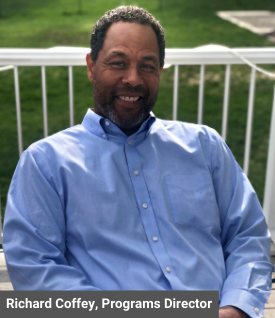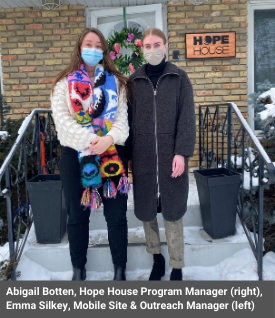 Social media intern Johan Wyckoff is helping 180 Degrees expand its use of social media to educate people about homelessness and sex trafficking of youth. Before Johan joined 180 Degrees, the Marketing team lacked the capacity to publish meaningful content across its social media platforms. Arriving last November as an intern, Johan joined the team right before Give to the Max Day, Minnesota’s biggest day of online giving, and began learning the ins and outs of digital campaigns. In January, Human Trafficking Awareness month, Johan pushed out a month-long educational campaign with stories and facts about human trafficking. The extra coverage helped donors better understand the realities Minnesota youth at risk of or experiencing sex trafficking face. A graduate of University of Wisconsin Eau Claire, Johan came to 180 Degrees with a background in writing, social media, and videography. He’s used these skills to help grow the organization’s social media presence. “We all want to make some kind of change in the world,” Johan said. “I don't have a million bucks that I could donate towards helping improve lives in my community. If I can work with an organization and provide support so they can get the funds and the attention they need to do these long-term projects, I'm fine with that.” Johan has found a professional fit in 180 Degrees, but his connection to the organization is much deeper. The mission is incredibly meaningful to Johan, and his time with 180 Degrees has opened his eyes to the powerful ways that he can use his professional skills to benefit the cause. “Working with 180 Degrees has been one of the best learning experiences I’ve ever had,” Johan said. “It’s like learning about a subject you only hear about in passing. But when you immerse yourself in it, you realize that it is a really serious mission anyone can be a part of.” Johan’s main goals for 180 Degrees social media presence are education and engagement, which he achieves using visuals, videos and facts. Johan’s advice for anyone considering volunteering at 180 Degrees: “Leave your expectations at the door and learn as much as you can.” Make sure to follow 180 Degrees on social media for future announcements and updates!
1 Comment
 Richard Coffey, Program Director at 180 Degrees, has had a career that spans many fields. He recounts the highlights: motivational speaker, a father, an ex-Timberwolf and Gopher, and an U.S. Army Airborne Paratrooper Veteran. Richard's journey began in Aurora, North Carolina. Shortly after graduating from high school, his dad encouraged him to either join the military or go to college; he promptly joined the 82nd Airborne Battalion and, after three years of service, went to school at the University of Minnesota. Though he achieved fame in collegiate and professional basketball, Richard's sports career would come to an end in 1998. He parlayed professional connections into a sales career, providing for his family. It was during his sales career that the question his mother always asked him started to bother him. "Who did you help today?" His mom would end each conversation over the phone with that statement. It did not stick at first, but over time it bothered him. So much so that he switched career paths in 2013; he went back to school in Administration. He even worked as a Dean for a few years. Now as Program Manager for 180 Degrees, Richard leads our shelter and supportive services programs, and a staff of 70 people. These Program Managers and direct care workers support people who struggle with the effects of poverty, racism, incarceration, and trauma. 180 Degrees has blossomed because of Richard's supportive and assertive style, much like how a basketball coach would strategically switch out players on the court. He uses his experiences to connect with those around him. He gives people chances to shine. Those who work closely with Richard during the day at 180 Degrees can all agree that his presence has a huge, positive impact. Leading the program team, Richard is a force for advocacy and change while providing hands-on mentorship. As I was talking with 180 Degrees staff, the collective response was, “Richard has been a true force of positivity... he is an inspirational leader and pushes you to be the best. He gives you chances to get your job right. If you are hitting a roadblock, he asks you questions about how you think you can improve yourself while giving positive feedback.” A Program Manager shares, “Richard has helped me realize that I have a voice in my community and it’s up to me to be an advocate for myself and those around me. I shouldn’t be a bystander and that motivates me to be my best.” Richard's guiding philosophy is centered on finding the inner courage to learn, even at the risk of failure. He believes more people should hold these words in their hearts: "The best leader is one who is able to surround himself or herself with people who are experts in their field.” It is a sobering reminder that we are students in our professions. People are constantly learning and adapting to changes -- when we can overcome the anxiety and fear, we make ourselves confident and powerful. That confidence can change lives and impact everyone -- through advocacy, support, or investment in people around us. So, I ask you this: Who did you help today?  In Minnesota alone, roughly 6,000 youth in have experienced homelessness. Leading research organization Chapin Hall at the University of Chicago estimates that among youth ages 13-17, at least 1 in 30 (roughly 700,000 youth) experience homelessness each year: Chapin Hall Youth Homelessness Brief. Most youth who are or have experienced homelessness have faced unhealthy family dynamics or have been kicked out of their home, leaving them to find shelter through couch hopping, relatives, or in unorthodox locations. Although each crisis varies from case to case; these cases all still count as homeless. 180 Degrees continues to empower youth and families to help stop the cycle of homelessness. Opened in 2015, Hope House Youth Shelter is open 24/7 for youth in crisis, ages 14-19. Hope House Program Manager Abigail Botten and Outreach Manager Emma Silkey work together to bring hope at this six-bedroom short-term crisis shelter in Excelsior, MN. Abigail describes Hope House as “a safe place for teens in crisis to [have] resources they need for their journey.” Many of the youth entering Hope House feel they have little control over their lives. Their experiences are rooted in things like shifting family dynamics and relationships, struggling to have their voices heard, and lacking control over their family's housing situations. At Hope House, staff meet youth where they're at and empower them along the way. Our goal is to help youth build control over their life and gain confidence with their autonomy. Youth are encouraged to develop personal goals and are introduced to community resources, setting them up with tools to take beyond the program. They gain control over their lives by determining the resources that best suit their needs. “A lot of youth just want the opportunity to have a say; being a teen is really hard... so what does that look like for us to be able to give youth the autonomy to have choices?” Abigail asks. She describes how giving youth control over what they want for a meal is a lesson in making choices. “It all comes down to that small window,” Emma continues, “It can translate to have the autonomy to make decisions down the road and does start with making small decisions.” Youth at Hope House are a part of a Youth Council that make decisions about daily activities at Hope House. This is another way to reinforce youth having control over their environment; something some youth have never experienced. Emma talks about the confidence youth gain at Hope House, “It is up to the [youth] to take the first step to ask for help, which can be hard...” she says, “There are so many more [people] that are with you, on your side... It’s about having the confidence to take that first step.” Community is an integral part of Hope House. Volunteers make meaningful contributions every week. Recently, seven boy scouts renovated the garage, creating a new Clothing Closet. Now youth have an easier time selecting clothing if they stay for several weeks. Throughout the year, volunteers provide essential needs, including meals, clothing, and even art supplies. “Without the support of the community, those that give financially, and those that give their time to help bring awareness to youth homelessness, we wouldn’t be where we are now.” Abigail finishes. Hope exists at Hope House -- youth are a part of a program that creates a safe space for healing and change. Make sure to follow Hope House on Instagram @HopeHouseMN. |
Newsletter:
|
